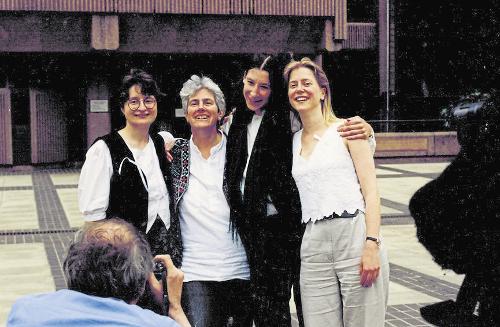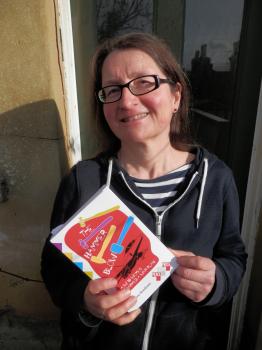

On 29 January, Peace News published a new book about the Seeds of Hope Ploughshares action, when a small group of women hammered on a British Hawk jet about to be exported to Indonesia to be used in the genocidal occupation of East Timor. The action took place 20 years ago, on 29 January 1996, and then the hammerers spent six months in prison until their case came to trial. The book is called The Hammer Blow: how 10 women disarmed a warplane. The subtitle reflects the fact that the women in the support group (including PN staffer Emily Johns) played a crucial role in making the action happen – and helping the women to win an acquittal, despite admitting the damage they had done. Andrea Needham, author of The Hammer Blow, talks to Emily about acquittal, prison, and writing.
EMILY JOHNS: If you admitted to having done all this damage, how did you end up being acquitted?
ANDREA NEEDHAM: We said we had done the damage, but in English law you are allowed to use ‘reasonable force’ to prevent crime, that’s the Criminal Law Act 1967.
We said what we were doing was reasonable force to prevent the crime of genocide in East Timor, and it was reasonable because we and hundreds of other people had done everything else in our power previous to the action to stop the sale of the Hawks to Indonesia. We’d marched and demonstrated and petitioned and done direct action and written to our MPs and everything else we could think of, and nothing had worked.
And the planes were about to be delivered to Indonesia.
Once they were delivered, there would be nothing further we could do to stop them being used to commit genocide in East Timor.
So we said that doing what we did [hammering on a Hawk jet identified as being about to be exported to Indonesia] was reasonable in the circumstances. The jury, having heard all the evidence about East Timor, and the Hawks, and what the Hawks were doing in East Timor, and about all the things we had done to try and stop it previously, found that that was reasonable. [Expert witnesses included investigative journalist John Pilger, professor Paul Rogers of Bradford University School of Peace Studies, and José Ramos Horta, then an East Timorese representative and later president of independent Timor-Leste.]
So we were acquitted.
E How easy is it for your ordinary person off the street, as a juror is, to understand that one could possibly be found ‘not guilty’ of something that one has done?
A The jury, probably most of them didn’t know anything about East Timor before they came into that courtroom, and I think that for the first few days they were quite puzzled: ‘The women have admitted this thing, but they’re pleading not guilty.... What’s that about?’
Because they were allowed to hear all the evidence about East Timor and the Hawks and what was going on there, and British complicity in it, then I think it all gradually began to make sense to them. It seemed to me that they were getting more engaged as the process went on.
“We had embarrassed the government once and they weren’t going to let us do it again.”
And really it’s a very simple defence, it’s not a sort of complicated legal thing at all. We used the analogy, because the trial was in Liverpool, and Liverpool was very badly bombed in the Second World War.... We said: ‘If somebody in Germany had felt that they didn’t want those planes to bomb civilians in Liverpool, would you think it was a criminal act for that person in Germany to go and nonviolently disarm a plane? That’s what we were doing.’
When you put it like that, it’s perfectly clear. The jury, or most of the jury, because it wasn’t a unanimous decision, it was a majority verdict, could see that, regardless of the fact that the judge is telling them, not exactly that they have to find us guilty.... I think what he said was: ‘No reasonable person could have done what they did.’
E Why do you think the judge was so resistant to the use of that defence?
A It was just outrageous, as far as he was concerned, people breaking in and smashing up somebody else’s property, then bringing in some half-arsed defence about trying to prevent crime. And I think he felt quite personally affronted by that.
But at the same time, because it was a high-profile case, possibly we could have appealed if he’d refused us permission to use that defence. And, as far as he was concerned, it was such a ludicrous thing that we were trying to say that there was no way any right-minded jury would accept that defence anyway, so he might as well let us have our day in court and we’d have nothing to complain about when we were convicted.
He seemed very angry at the moment when the verdicts were announced. He dashed out of the courtroom and that was the end of it.
E Just as well a judge can’t appeal against a jury!
At the moment, in the US, a judge is allowing some climate activists to use a ‘necessity’ defence in a trial.
A I think that increasingly one could make that argument in terms of climate change. Either ‘using reasonable force to prevent crime’ or, if you’re charged with criminal damage, you’re allowed to use the defence that you were acting to prevent damage to property.
So, arguably, one could say: ‘I destroyed this coal-mining equipment because burning fossil fuels is submerging people’s houses in islands in the Pacific.’ That’s possibly an arguable defence at this point in history.

Remembering
E How has it been writing it all down in a book, remembering? What’s the process of writing a book about the action been like?
A I wrote the first draft 18 years ago. Not very long after the action, when it was fresh in my mind, and I wrote it largely from prison diaries, and notes that I’d taken, and things like that.
It’s only in the last year that I’ve come back and revised it. It feels in a way like ancient history. It’s quite odd trying to remember how I was feeling at the time. It’s been slightly tortuous. (laughs)
E When you were writing the diaries, were you semi-conscious that it would be useful to write a diary beyond a need to record things?
A I don’t think I was doing it with any thought of what I might do with it in the future. I think it was more: ‘This is an extraordinary time in my life, and I want to be able to remember that, because I have a terrible memory.’
At the time, it was a grounding thing. Prison was really, really difficult. When you’re in a situation where we were locked up every day and there was nobody to talk to, writing really helped to deal with the emotions and feelings and frustrations of prison.
E Do you keep a diary now? Seeing as you are still active and doing extraordinary things?
A I don’t think I am doing extraordinary things now. So I don’t keep a diary. My life is a mystery to me. Soon as it’s happened, I’ve forgotten!
E It is amazing, in the book, the bit about the gathering, where the group of you first decides: ‘Hey! Let’s do an action!’ And although it’s just a weekend you spent together, it somehow suddenly seemed to gel. In itself, that’s extraordinary.
A It was! It was a gathering about Ploughshares [in the international Ploughshares movement, people use household hammers to disarm military equipment], but I don’t think any of us had come along to that weekend thinking: ‘I’d like to do a Ploughshares action!’
We had a workshop on women and Ploughshares, and something suddenly happened. A few of us just thought: ‘You know what, we could do this! Let’s do this!’ It just kind of made sense, particularly because of where we were at with the Hawk campaign.
Prison
E What was the best thing about being in prison?
A Getting out of prison!
E What were some nice moments, highlight moments?
A There was a real sense of community in prison.
One of my big worries before going into prison was: ‘What would other women think of us? Would we stand out because, in a way, we’d almost chosen to be there?’ We never experienced any ill-feeling from the other women. There was a lot of support. Particularly because we were treated differently from all the other women. We were treated politically....
E Better or worse?
A Worse, and the other women could see the unfairness; that we were banned from doing things that other women were allowed to do, we were banned from certain parts of the prison, we were banned from particular classes.
E It’s extraordinary isn’t it that there are political prisoners. If this was in Northern Ireland, it would be a recognised issue, but you don’t think of British prisons having political prisoners.
A And they would deny it. They would never accept that we were political prisoners. At first they tried to pretend that we had to have extra security because we had broken into this high-security site therefore we might break out of prison, which was obviously a nonsense.
Eventually it came out, the head of security said that we had embarrassed the government once and they weren’t going to let us do it again. I think their concern was that we would organise some kind of prisoner rebellion because they thought we were the only ones capable of doing that kind of thing.
The support we got from outside, the mountains of mail we got every day, was fantastic, a real highlight.
E Is there anything you’d say: ‘It’s worth going to prison to experience this?’
A I think it’s worth going to prison to experience it. Most people don’t know what goes on in prisons.
After I came out, I volunteered for quite a long time for the Prison Reform Trust because it really affected me. The appalling conditions, the injustices....
There are so many women in prison, something like 70 or 80 percent of women, who have mental health problems. A huge number have drug problems. If you look statistically, huge numbers of women in prison have been abused either in childhood or through domestic abuse.
“Really it’s a very simple defence, it’s not a sort of complicated legal thing at all”
These are people who’ve been dealt the worst cards in life. They’ve been just crapped on by society. And the only way society knows to respond is to put them in prison.
As a left-leaning kind of person, you think there are people in prison who shouldn’t be there, but when you’re actually there and you’re sharing cells with people and you’re hearing their stories.... There are so many of those women who just shouldn’t be there. They’ve committed nonviolent offences, very often because they have drug problems, and there are so many issues in their lives, and the last place they need to be is banged up in prison.
Probably because we were quite high-profile, I think, we were taken more seriously than some of the other prisoners. And we did make a lot of complaints.
Even though it was your right to have an hour’s exercise every day, when we got there, there was just no exercise for anybody. Maybe once a fortnight, if it was sunny on a Sunday afternoon, they might let you out for 20 minutes. We complained, and we complained, and we complained, and we complained. Until we were getting our exercise every day.
Exercise, that was the best thing about prison!
E Lovely yard!
A The swimming pool in Holloway! [Andrea went to Holloway prison in London briefly while awaiting trial for the Hawk action.]
E So what was the worst thing?
 A I think for me there were two things. There was the noise, which I never got used to. It’s never quiet in prison. There’s always someone screaming and banging and playing their radio and it just drove me off my head.
A I think for me there were two things. There was the noise, which I never got used to. It’s never quiet in prison. There’s always someone screaming and banging and playing their radio and it just drove me off my head.
And the other thing was what was usually referred to as ‘fucking with your head’. The rules were unwritten and they changed constantly, and one prison officer would have one rule and another prison officer would have another rule. ‘Okay, you were allowed to do this yesterday, but today we’re going to punish you for doing it.’
You were not allowed to question it, you just had to do it, no matter how stupid it appeared to be.
‘Oh, I’ve cancelled exercise today.’ And that was your only chance in 24 hours to leave the building. To them, it was nothing. Whereas to me, I would be absolutely devastated. I’d been looking forward to it, I’d been counting down the minutes, I’d been waiting for it excitedly: ‘I need to get out! I want to get outside!’
Then it’s cancelled, and you ask why, and they’d say: ‘Because I said so.’ That sort of petty power stuff I found very hard to deal with. I probably should have practiced yoga or meditation. (laughs)
Strategy
E So... going on a booktour.
A Even though what we did was 20 years ago, I think it has a lot of relevance to the struggle against climate change, and people thinking about what kind of action needs to be taken. I hope the booktour is a chance to get out there and inspire people.
E Strikes me that one of the things about the Seeds of Hope action is about how direct action fits into the strategy of a campaign. It wasn’t just a random thing, but it was a very useful leverage and tool for the anti-Hawks campaign. It shifted the campaign onto a different footing in relation to the government and in relation to arms trade sales.
A You should be doing this interview! (both laugh) It is important to think strategically. Everything you just said. Obviously our action did fit into the campaign really well because everything else had been done already.
If we had just dropped in out of the blue and done that action as the first act of campaigning, I doubt very much that we would have been acquitted.

